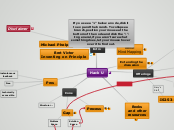arabera Gary Sibbitts 10 years ago
886
Hack U

arabera Gary Sibbitts 10 years ago
886

Honelako gehiago
Presentation for lambda lounge on July 2, 2015
link to this presentation: http://bit.ly/SibbittsHackU
This map/presentation will explore a few of the many options available to anyone desiring to become a programmer or who want to expand their skill set. We will also touch on some of the pros and cons of the current offerings for budding hackademics.
It is assumed that learners possess solid problem solving skills, A.K.A. - process.
Most resources, online and otherwise fail to help learners develop their problem solving skill while the learn how to program.
In most cases, students have difficulties making the transition from the problem space to the solution space. How many of you can write a 10 page paper in one sitting and get it the way you want? I'll bet you followed a process.
Follow this link to a public map that you can contribute to to extend the discussion.
A link to a map I used during one of my C# Programming II classes at Meramec.
This site was brought to my attention by a colleague at Meramec, a French professor, Roy Day. He was working his way through some of these classic challenges using Python. I didn't really know Python, and still don't, but with the help of the HackerRank site, I was able to provide him with some guidance.
I was introduced to this site by the folks at LaunchCode. I encouraged my students to sign up so they could give it a whirl. This site is also a great way to learn other languages. It is able to convert code from one language to another. Be forewarned, there is one language listed that many may find to be offensive. I will let you apply your own sensibilities.
By making a "few" changes to the examples used to demonstrate language features, the code can also model both best practices for coding and problem solving process.
All opinions and observations expressed here are my own and are in no way to be taken as gospel or absolute truth. In fact, I suspect that a few things might change between now and when I give the presentation as well as then and in the future.
The primary purpose of this presentation is to highlight the various ways in which individuals can "hack" their own education to fulfill their dreams of becoming programmers. Secondarily, it is to point out certain areas where improvements could be made to make the opportunity more readily attainable without compromising the end goal. Not everyone will win a medal in the race to become a programmer. However, if they don't like putting their face in the water, see Michael Phelps, they still might have what it takes to do great things.
At age 7, Phelps was still "a little scared" to put his head under water, so his instructors allowed him to float around on his back. Not surprisingly, the first stroke he mastered was the backstroke.
Watch from 2:30 through 6:00